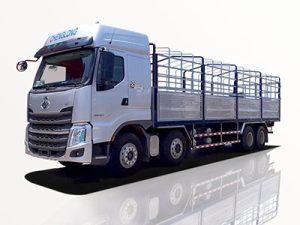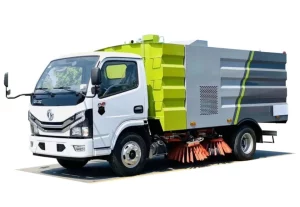Monday to Saturday - 8:00 -17:30
Understanding Hydraulics on Trucks: A Comprehensive Guide
Hydraulics play a crucial role in the operation and efficiency of trucks. From lifting heavy loads to providing power steering, hydraulic systems are integral to truck performance. This article delves deep into the world of hydraulics on trucks, explaining their functions, types, maintenance tips, and more.
What are Hydraulics?
Hydraulics is the branch of science that deals with the mechanical properties of liquids. In a hydraulic system, liquids are used to transmit force. This technology is widely used in various industries, including automotive, to operate and control different machinery.
How Hydraulics Work on Trucks
Hydraulic systems in trucks utilize hydraulic fluid to transmit power efficiently. A pump moves the hydraulic fluid through hoses and controls to actuate different components. The primary components of a hydraulic system include:
1. Hydraulic Pump
The hydraulic pump generates flow and pressure in the system. It pulls hydraulic fluid from the reservoir and sends it through the system.
2. Hydraulic Fluid
Hydraulic fluid is essential for transmitting power. It typically contains additives to reduce friction, prevent corrosion, and inhibit foaming.
3. Actuators
Actuators are devices that convert hydraulic energy into mechanical energy, commonly seen in hydraulic cylinders or motors.
4. Control Valves
Control valves manage the flow of hydraulic fluid, ensuring that the right amount reaches the actuators according to operational needs.
5. Reservoir
The reservoir holds the hydraulic fluid, allowing for a consistent supply to the system while accommodating fluid expansion and contraction.
Types of Hydraulic Systems in Trucks
Different types of hydraulic systems serve various functions in trucks. Here are the most common types:
1. Hydraulic Braking Systems
Hydraulic brakes utilize brake fluid to transfer force from the brake pedal to the brake pads, providing effective stopping power.
2. Power Steering Systems
Power steering systems use hydraulic pressure to assist in steering, making it easier to maneuver large trucks.
3. Lift Systems
Many trucks use hydraulic lift systems to raise cargo beds or platforms for loading and unloading cargo.
4. Dump Systems
Dump trucks are equipped with hydraulic systems that allow the truck bed to tilt, lowering cargo quickly and efficiently.
Main Benefits of Using Hydraulics in Trucks
Integrating hydraulic systems in trucks offers numerous benefits:
1. Increased Lifting Capability
Hydraulic systems can lift significantly heavier loads compared to mechanical systems.
2. Precise Control
Hydraulics allow for smooth and precise control of operations, essential in applications like loading and unloading.
3. Space Efficiency
Hydraulic components require less space than mechanical alternatives, providing more room in truck design.
4. Reduced Wear and Tear
Hydraulic systems can operate with less wear compared to mechanical systems, extending the lifespan of components.
Common Applications of Hydraulic Systems in Trucks
Here are some prevalent applications of hydraulic systems in the trucking industry:
1. Cargo Transport
Trucks equipped with hydraulic lift gates can efficiently load and unload heavy cargo.
2. Waste Management
Garbage trucks use hydraulics for compacting waste and lifting bins.
3. Construction
Many construction vehicles utilize hydraulic systems for moving materials and equipment around job sites.
Maintenance Tips for Hydraulic Systems on Trucks
Regular maintenance is vital for the longevity and efficiency of hydraulic systems. Here are some practical tips:
1. Regular Fluid Checks
Regularly check the hydraulic fluid levels and quality. Replace fluid that appears contaminated or degraded.
2. Inspect Hoses and Fittings
Inspect hydraulic hoses and fittings for leaks or cracks. Replace damaged components immediately to prevent system failure.
3. Keep Components Clean
Ensure all hydraulic components remain clean to prevent contamination, which can lead to system damage.
4. Monitor Performance
Pay attention to any unusual noises or performance issues, as these can indicate underlying problems.
Challenges in Hydraulic Systems on Trucks
While hydraulic systems offer numerous benefits, they also come with challenges:
1. Fluid Leaks
Fluid leaks can lead to reduced system efficiency and can also be hazardous in certain environments.
2. Temperature Control
Hydraulic systems can overheat if not properly managed, which can lead to fluid degradation and component failure.
3. Contamination
Hydraulic fluid can become contaminated with dirt, moisture, or air, affecting system performance.
Future Trends in Truck Hydraulics
The future of hydraulics in trucks is evolving with technology. Here are some anticipated trends:
1. Electrification of Hydraulic Systems
Combining electric and hydraulic systems to enhance efficiency and reduce emissions is gaining traction.
2. Advanced Monitoring Systems
Real-time monitoring systems will allow for proactive maintenance, reducing downtime and enhancing productivity.
3. Improved Fluid Technology
Development of advanced hydraulic fluids that extend system life and offer better performance is on the rise.
Hydraulic Systems and Sustainability
Sustainability is becoming increasingly important in the trucking industry. Here are some key points to consider regarding hydraulics:
1. Use of Biodegradable Fluids
Switching to biodegradable hydraulic fluids can reduce environmental impact and enhance sustainability efforts.
2. Energy Efficiency Enhancements
Improving energy efficiency in hydraulic systems can lower fuel consumption and emissions in trucks.
3. Recycling of Components
Implementing recycling programs for hydraulic components can contribute to a circular economy, reducing waste.
Frequently Asked Questions (FAQs)
1. What types of hydraulic fluids are used in trucks?
There are several types of hydraulic fluids, including mineral-based, water-based, and biodegradable fluids, each with its own properties and advantages.
2. How often should hydraulic fluid be changed?
Hydraulic fluid should generally be changed according to the manufacturer’s recommendations, typically every 1 to 2 years or when contamination is detected.
3. What are signs of hydraulic system failure?
Signs of hydraulic system failure include unusual noises, leaks, reduced lifting capacity, and erratic movement of hydraulic components.
4. Can hydraulic systems be repaired?
Yes, many hydraulic system components can be repaired or replaced, depending on the extent of the damage.
5. What should I do if I notice a hydraulic leak?
If you notice a hydraulic leak, stop using the vehicle immediately and consult a professional mechanic to assess and repair the leak.
6. Are power steering systems in trucks hydraulic?
Yes, most power steering systems in trucks utilize hydraulic power to assist with steering, making it easier to handle larger vehicles.









